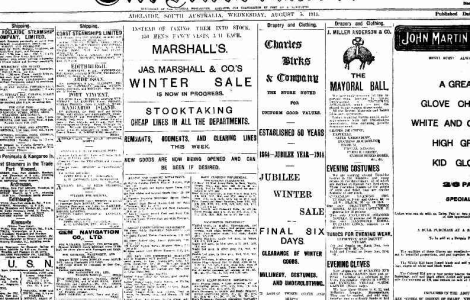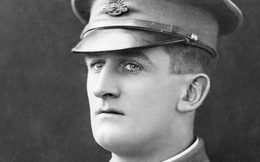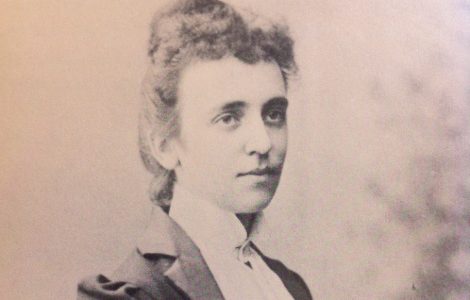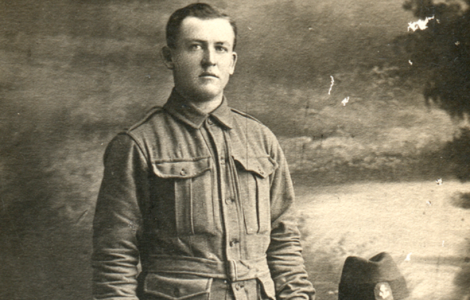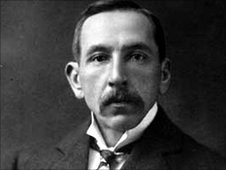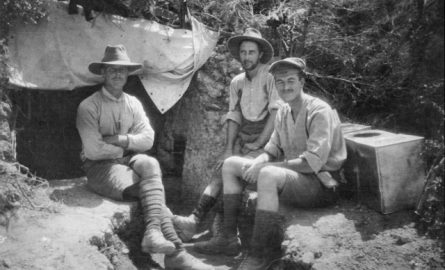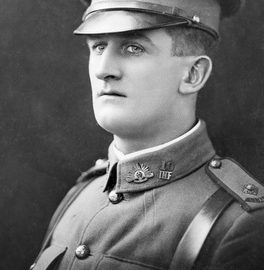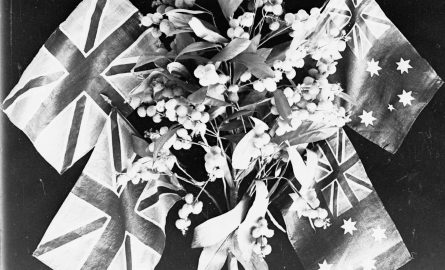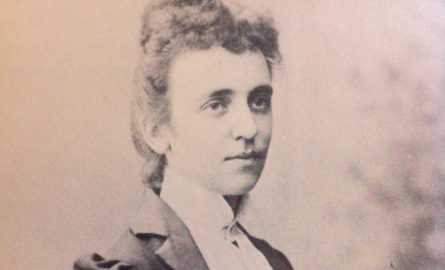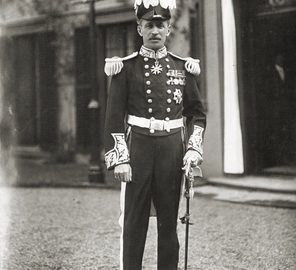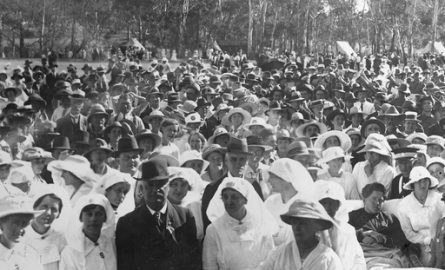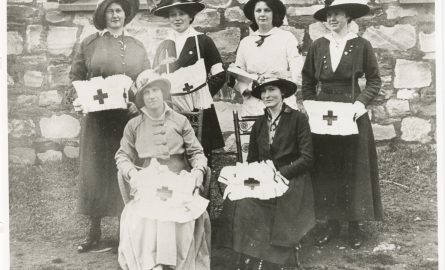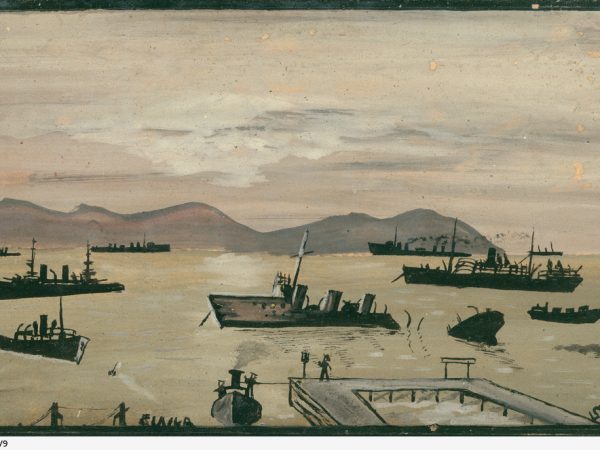
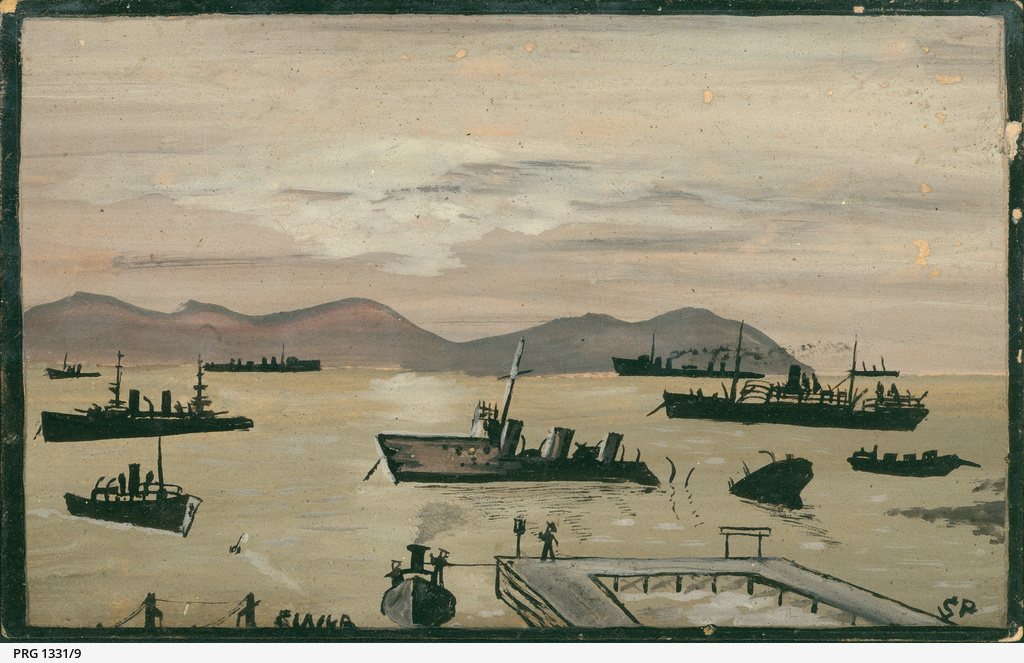
Leo Terrell send this postcard, a sketch of Suvla Bay, to his girlfriend Clara in November 1915. Image courtesy State Library of South Australia PRG-1331-9
November, 1915
November didn’t offer the new Australian Prime Minister much of a honeymoon, nor offer much relief in the Dardanelles either.
AUSTRALIAN POLITICS
When November 1915 began, new Prime Minister Billy Hughes was already under enormous pressure. At home, the cost of living continued to rise. While the government blamed the War and drought, the left were laying blame at the feet of ‘the Huns of Commerce’, suggesting that the burden was being borne by the workers, who were also expected to fill the ranks of the military.
Hughes was also under pressure from the ever increasing need for more enlistments. A pro-conscription movement had gathered momentum in NSW from September, but it didn’t gain traction in other states. The fact remained however, that 50,000 new recruits were needed to meet the goal of increasing the size of the AIF. During October less than 10,000 new recruits enlisted. This was considerably lower than previous months and well below what was required.
ON THE FRONTLINES
We only have diary entries from two of our soldier correspondents this month – Lou Avery was still in Egypt recovering from serious illness and he didn’t record anything in his diary, while the official diary of the 10th Battalion is missing entries for November. James Churchill-Smith, who only landed in the Dardanelles in October, was still caught up in the excitement of being part of the war. Early in the month his biggest concern seemed to be the lack of parcels from home; later fleas and lice were a problem. Towards the middle of the month his battalion (the 10th) prepared to leave the frontline for rest but were held up by bad weather. They finally departed on 22 November, which coincided with the decision to wind back Allied operations in the Dardanelles.
Leo Terrell, on the other hand, had a thoroughly miserable month. The weather at Suvla Bay where he was stationed was cold and wet early in the month and unbearable by the end. His duties at the end of the month included going out with a party to bring in frost-bitten soldiers and he writes that the ‘trenches are a sight never to be forgotten, being 4 ft deep with water with ice 3 and 4 inches thick’. But awful as it was, the weather and the Turks were not the only grievances recorded in Leo’s diary. He continued to complain about the ‘very incompetent lot of officers who have not the slightest sense or idea of doing anything’. His diary recalls that: because he attempted to write the truth in a letter to his mother, the censor ‘will hardly pass a letter’ that he writes; and he was also in trouble for not turning out on parade on time, and was punished for three days, ‘making my day’s work start at 5.15 am and finish at 9pm’.
In Germany, Adelaide musician Ethel Cooper played a concert in a hospital where wounded soldiers were recovering. She was clearly moved by what she saw, writing to her sister: ‘They are scarcely human beings any more – just shattered remnants of men – some with no legs, no arms, half a face gone – it is just appalling and haunts one.’
PATRIOTIC EFFORTS ON THE HOMEFRONT
On 4 November, the Governor of South Australia, Sir Henry Galway, officially opened the Cheer-Up Hut. This was the culmination of months of fundraising by Alexandrine Seager’s Cheer-Up Society, that had been established 12 months earlier to provide comforts for soldiers in South Australia. Initially the Society served new recruits in training before their departure, but of course by November 1915, a number of wounded soldiers had returned, as well. The Cheer-Up Hut was located on the banks of the Torrens, adjacent to the City Baths, where the Festival Centre now stands.
Lady Galway, the Governor’s wife, also had a busy month with her own charity work, including a fair at Government House benefitting both the Red Cross and the Belgian Relief Fund.
IN OTHER NEWS
On 15 November Winston Churchill resigned from the Government in order to serve in the Army in Europe. This news received considerable coverage in South Australia, given Churchill’s role in the planning of the Dardanelles campaign. Churchill had been replaced as First Lord of the Admiralty some months before, but when excluded from the War Council, he ‘object[ed] to draw[ing] a large salary without doing adequate work’.
And of course, it was Melbourne Cup time, too. In 1915, Patrobus was victorious, but three horses fell in the race.
As November closed, the AIF withdrawal from the Dardanelles had commenced, but of course those at home were not aware of this. Indeed, the secrecy with which the withdrawal was completed was one of the successes of the campaign. But as one aspect of Australia’s involvement in this war was beginning to wind back, Prime Minister Billy Hughes was preparing to visit England where new plans would be discussed.


